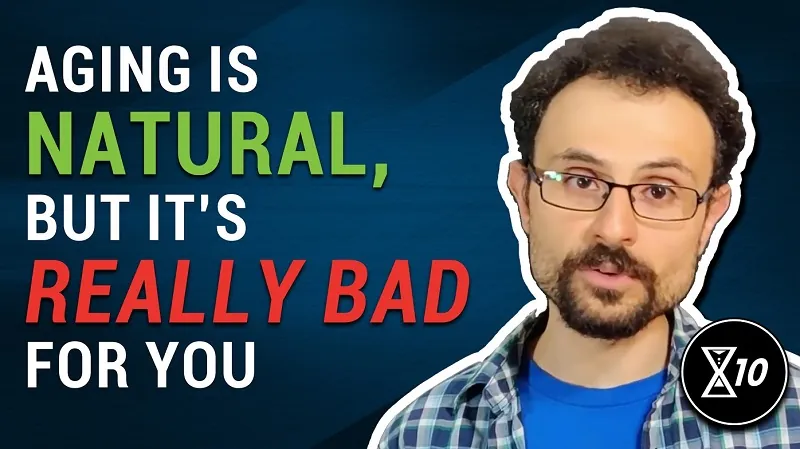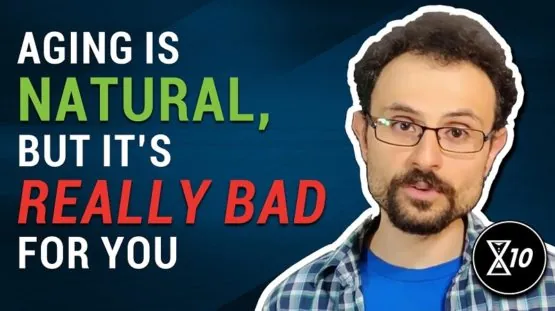In this week’s informative episode, Nicola discusses whether or not life extension is natural – and whether or not that matters for your health.
A transcript of this episode is available below.
This YouTube show is all about healthy life extension, and as such, it is very much in favor of research on and development of rejuvenation biotechnologies that undo aging. But hang on—aging is just natural, and rejuvenation is not, right? Maybe, but actually, it doesn’t really matter. First things first: what does natural even mean? If you look it up in the dictionary, the word “natural” has several different though related meanings, the first one being existing in or derived from nature; not made or caused by humankind. If we go by this definition, then, obviously, aging is natural, since humans certainly didn’t create it, whereas rejuvenation biotechnologies are certainly not natural, because they are a human invention currently in the making. However, this is not quite what people mean when they object that aging, non-GMO food, or whatever, is natural while rejuvenation and GMOs are not. When you say that something is natural, more often than not, the underlying implication is that it is also good for you; likewise, saying something is not natural often implies that it’s bad for you somehow. You might feel that these covert implications are, well, natural, but, in fact, they betray a fallacious reasoning commonly known as the fallacy of appeal to nature. As you may have guessed, the incorrect reasoning that gives the fallacy its name consists of arguing that all which is natural is good and that all which isn’t natural is bad. It’s really not difficult to find counterexamples that show why this reasoning is wrong; there are plenty of perfectly natural things—according to the definition we gave before—that are seriously bad for living things in general, such as viral infections, volcanic eruptions, and being eaten by a predator. All of these, and many others, exist in nature and require no human intervention, so they’re perfectly natural; yet, they’re not that good for you. Another good example is cancer, an often fatal disease caused by mutations in your DNA making cells go haywire and replicate indefinitely, and these mutations can easily occur naturally during the normal cell replication process, even if you don’t chainsmoke or munch on asbestos chip cookies. Similarly, there is an overabundance of unnatural things that are good for us; if you think about it, we’ve been creating “unnatural” things to improve our lives since day one, starting with the simplest tools to end up with comfy homes, precision medicine, computers and the Internet, and the list goes on with nearly anything human-made. Now, it is true that some human-made things can be really bad for you, but that often depends on how they are used. Nuclear technology isn’t intrinsically good or bad: you can use it to power a city and improve lives, or to blast away a city and destroy lives, and only one of these two things is generally thought of as a good one. This also applies to some natural things. For example, viruses are generally bad for you, but scientists can exploit them to manufacture vaccines or use them as vectors for genetic therapies to cure diseases, turning bad into good. The take-home message from these examples is that whether something is or isn’t natural isn’t enough to tell if it’s good or bad; it depends on other factors. Let’s go back to aging and rejuvenation. As said, aging is entirely natural, but this isn’t enough to make it good for you. Aging isn’t a single process; there’s actually several of them going on under the hood, and the scientists who study them all agree that it’s because of the relentless, life-long action of these processes that age-related diseases, such as hypertension, diabetes, and dementia, eventually manifest. So, aging causes diseases, which, in turn, cause suffering, loss of independence, and even death, which is a pretty dead giveaway that aging is actually really bad for you. On the other hand, rejuvenation biotechnologies are “unnatural” therapies that interfere with the processes of aging to prevent or cure their related diseases, thus eliminating suffering and saving your independence and your life, which is a rather good thing for anyone who prefers enjoying life over being sick or dead. A similar concern that people sometimes have is that rejuvenation biotechnology would extend people’s lifespan beyond its “natural” limits, but, actually, talking about “limits” is not accurate; it makes more sense to talk about vulnerability to death. We’re vulnerable to death at any age, and probably we will always be, but the less vulnerable to it we are, the less likely it is that we will die. Young people are generally very healthy; their bodies are more functional and resilient, which makes them less vulnerable to death. For example, a young person can generally recover fairly easily from influenza, while in the case of an older person, it may cause the development of pneumonia and result in death. For a young person, slipping on an icy road may be painful, but it often just makes for a funny story about how silly you looked with your butt on the ground; on the other hand, for an older person, falling on ice can easily result in a broken hip, which has life-threatening complications. What rejuvenation biotechnologies would do is simply reduce the vulnerability to death that we experience in later ages so that, ideally, we wouldn’t be any more vulnerable to death in our 90s, or later, than we were in our 20s. Conceptually, this isn’t any different from what vaccines do: a vaccine against tuberculosis, for example, reduces your vulnerability against this particular cause of death pretty much to zero; rejuvenation biotechnologies would reduce your vulnerability to age-related diseases, allowing you to live a healthier, longer life. How much healthier or longer depends a great deal on how hard we work on building effective rejuvenation therapies. Thank you very much for watching this episode of X10 LE 101, and a special shout-out to the Lifespan Heroes, the fantastic people who help us keep going thanks to their donations; without them, there would be no LEAF, no Lifespan.io, and no X10. If you’d like to join the Lifespan Heroes, head over to lifespan.io/hero to make your monthly pledge, which entitles you not just to well-deserved bragging rights but also super-nice perks, such as participating in our exclusive webinars with aging researchers and paying half price for tickets to our upcoming conference, Ending Age-Related Diseases, in New York City.

